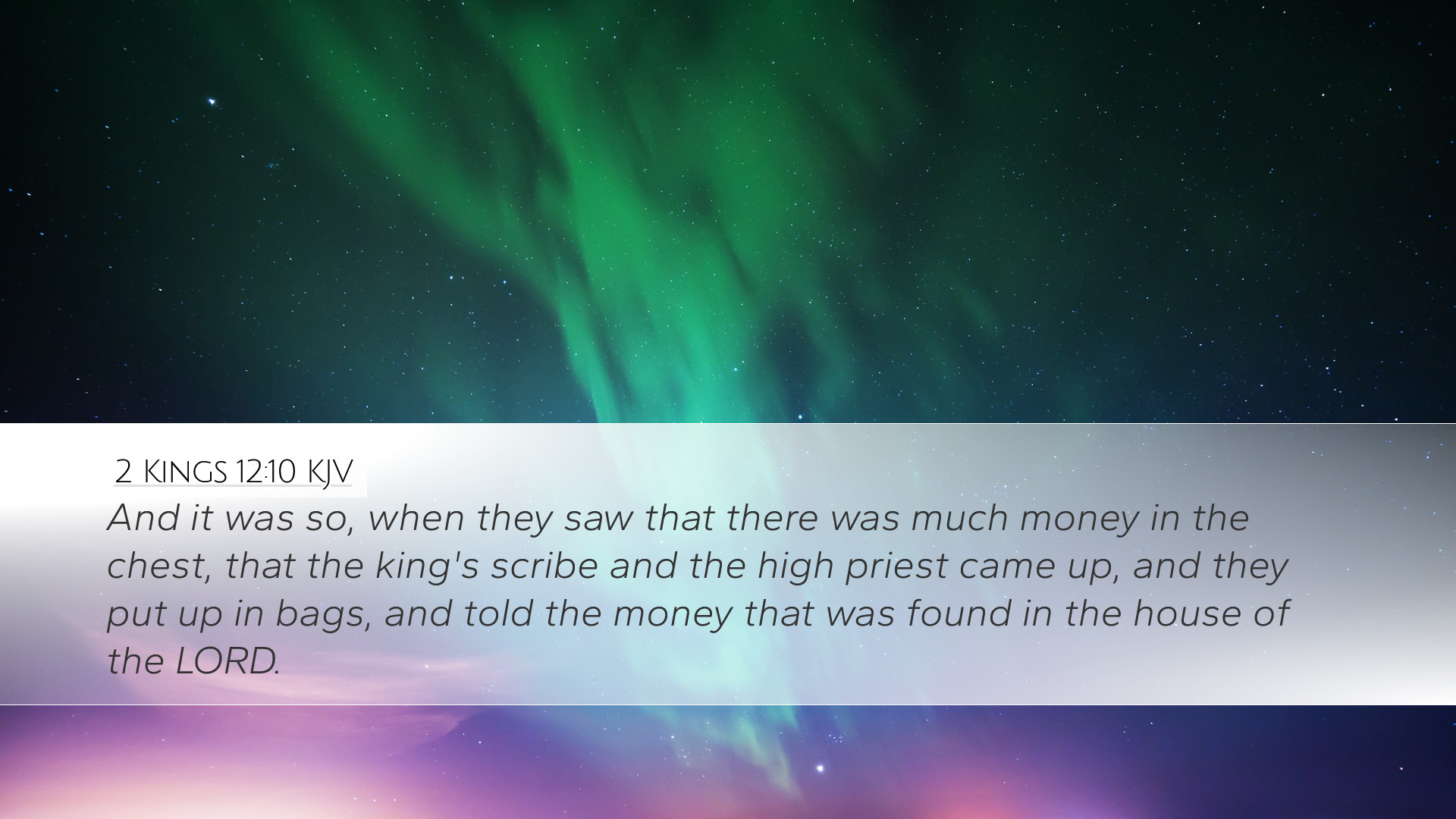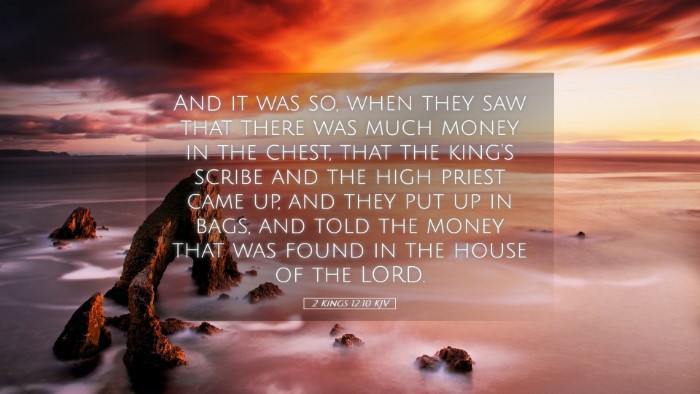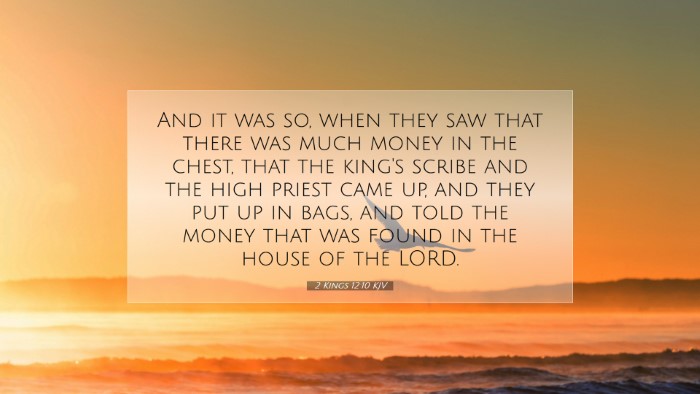Old Testament
Genesis Exodus Leviticus Numbers Deuteronomy Joshua Judges Ruth 1 Samuel 2 Samuel 1 Kings 2 Kings 1 Chronicles 2 Chronicles Ezra Nehemiah Esther Job Psalms Proverbs Ecclesiastes Song of Solomon Isaiah Jeremiah Lamentations Ezekiel Daniel Hosea Joel Amos Obadiah Jonah Micah Nahum Habakkuk Zephaniah Haggai Zechariah Malachi2 Kings 12:10
2 Kings 12:10 KJV
And it was so, when they saw that there was much money in the chest, that the king's scribe and the high priest came up, and they put up in bags, and told the money that was found in the house of the LORD.
2 Kings 12:10 Bible Commentary
Commentary on 2 Kings 12:10
Verse: "And it was so, that when they saw that there was much money in the chest, that the king's scribe and the high priest came up, and they put up in bags, and told the money that was found in the house of the LORD."
Introduction
The passage from 2 Kings 12:10 provides a glimpse into an important moment in the maintenance of the Temple of the Lord under the reign of King Jehoash (Joash). This verse illustrates an aspect of the administrative activities related to the Temple, which reflects both the spiritual and temporal responsibilities of the Jewish leaders of the time. Various commentaries shed light on the themes of stewardship, worship, and the importance of prioritizing God's house.
Insights from Matthew Henry
Matthew Henry emphasizes the significance of the collectivity and transparency in the handling of temple funds. He notes:
- Divine Order: Henry explicates the orderly manner in which the funds were collected and reported, highlighting that the scribe and high priest collaborated. This cooperation is indicative of the divine order expected in the governance of sacred matters.
- Accountability: Money collected for the temple service is treated with utmost care. The meticulous counting and storing in bags underline the principle of accountability in using resources for God’s service, which can serve as a principle for church administration today.
Insights from Albert Barnes
Albert Barnes provides a contextual analysis, focusing on the historical and theological implications:
- Historical Context: Barnes notes that this event follows a period of neglect regarding the temple's condition, and Jehoash’s reign represents a significant restoration effort. The money collected is crucial for fulfilling this restoration.
- Theological Significance: He points out the symbolism of the chest (or box) used for the gathering of funds. It is not just a physical container; it signifies the people's commitment to God and highlights their collective responsibility toward the worship of Yahweh.
Insights from Adam Clarke
Adam Clarke discusses the administrative practicality and the spiritual themes tied to this verse:
- Practical Administration: Clarke emphasizes the methods adopted by the priests and officials in managing finances. The verse sheds light on the system of counting and managing the church’s finances, which is essential for effective stewardship in any modern congregation.
- Spiritual Reflection: Clarke articulates that the act of collecting funds for temple service is more than just financial logistics; it is an act of worship reflecting the community’s dedication to God. He sees in this practice a higher call toward divine servitude and collective worship.
Thematic Analysis
Analyzing the themes from the commentaries presents a broader understanding:
- Stewardship: A central theme in this verse is the notion of stewardship. The leaders in this passage acted not only out of obligation but also out of recognition of their duties to God and the community. This serves as a model for modern church leaders in prioritizing the upkeep of communal worship spaces.
- Community Responsibility: The involvement of both the high priest and king’s scribe indicates shared responsibility. This collective effort reflects the importance of unity in the pursuit of God’s work. Today, fostering a sense of community in church responsibilities is essential for spiritual growth.
- Integrity in Worship: The verse underscores the importance of integrity in worship practices. The transparency in financial dealings is a call for ethical stewardship within the church, inviting leaders to hold themselves accountable to their congregations.
- Restoration and Renewal: The restoration of the temple serves as a metaphor for spiritual renewal. Just as the funds were raised for physical restoration, congregations are often called to revive their spiritual fervor and commitment to God.
Conclusion
The commentary on 2 Kings 12:10 reveals a multifaceted view of temple stewardship, emphasizing the shared responsibilities of spiritual leaders and congregants alike. The insights from Matthew Henry, Albert Barnes, and Adam Clarke contribute to a deeper understanding of the verse's implications for both historical context and modern application. Such reflections on stewardship, community responsibility, and integrity in worship resonate powerfully for pastors, theologians, and students of the Bible today, encouraging them to engage in practices that honor God and reflect His divine order.


